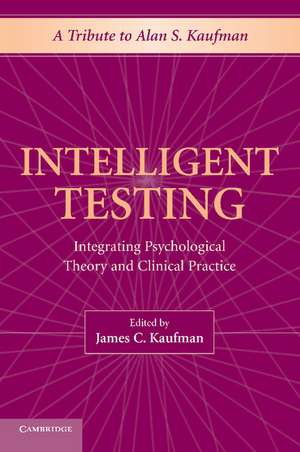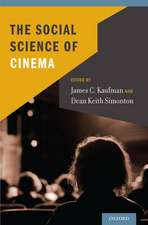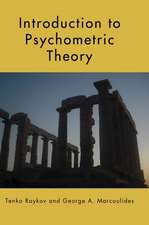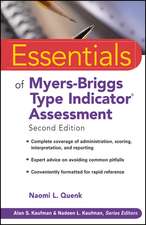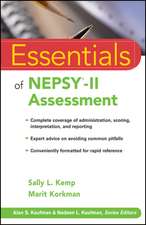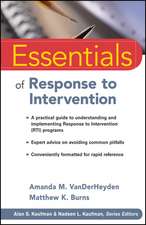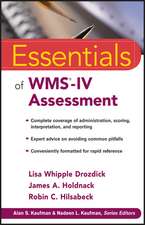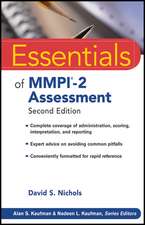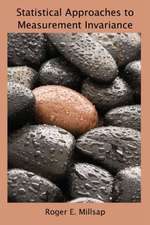Intelligent Testing: Integrating Psychological Theory and Clinical Practice
Editat de James C. Kaufmanen Limba Engleză Paperback – 10 sep 2014
| Toate formatele și edițiile | Preț | Express |
|---|---|---|
| Paperback (1) | 315.16 lei 6-8 săpt. | |
| Cambridge University Press – 10 sep 2014 | 315.16 lei 6-8 săpt. | |
| Hardback (1) | 466.14 lei 6-8 săpt. | |
| Cambridge University Press – 15 mar 2009 | 466.14 lei 6-8 săpt. |
Preț: 315.16 lei
Nou
Puncte Express: 473
Preț estimativ în valută:
60.31€ • 64.49$ • 50.28£
60.31€ • 64.49$ • 50.28£
Carte tipărită la comandă
Livrare economică 17 aprilie-01 mai
Preluare comenzi: 021 569.72.76
Specificații
ISBN-13: 9781107423558
ISBN-10: 1107423554
Pagini: 264
Ilustrații: 4 b/w illus. 2 tables
Dimensiuni: 153 x 230 x 14 mm
Greutate: 0.36 kg
Editura: Cambridge University Press
Colecția Cambridge University Press
Locul publicării:New York, United States
ISBN-10: 1107423554
Pagini: 264
Ilustrații: 4 b/w illus. 2 tables
Dimensiuni: 153 x 230 x 14 mm
Greutate: 0.36 kg
Editura: Cambridge University Press
Colecția Cambridge University Press
Locul publicării:New York, United States
Cuprins
Part I. Those Who Know Him: 1. Alan S. Kaufman's contributions Nadeen L. Kaufman; 2. Who is Alan S. Kaufman? Elizabeth O. Lichtenberger; 3. Alan S. Kaufman: the man and the professional Jennie Kaufman Singer; Part II. Intelligent Testing: 4. Intelligent testing: bridging the gap between Classical and Romantic science in assessment Elaine Fletcher-Janzen; 5. The intelligent testing of children with specific learning disabilities Nancy Mather; 6. Temperament preferences for children ages 8 through 17 in a nationally represented sample Kyle Bassett and Thomas Oakland; 7. Intelligent intelligence testing: the influence of Alan S. Kaufman Jack A. Naglieri; Part III. The Intersection of Theory and Measurement: 8. Kaufman on theory, measurement, interpretation, and fairness: a legacy in training, practice, and research Samuel O. Ortiz and Dawn P. Flanagan; 9. The theory of successful intelligence as a basis for new forms of ability testing at the high school, college, and graduate school levels Robert J. Sternberg; 10. Kaufman's work in the penumbra between measurement science and clinical assessment Randy W. Kamphaus and Cecil R. Reynolds; 11. Success is a latent variable: how Alan Kaufman shaped intelligence test theory, interpretation, and psychometrics with factor analysis Jason C. Cole; Part IV. Kaufman Across the World: 12. The K-ABC in France Claire Énéa-Drapeau and Michèle Carlier; 13. Dr. Alan Kaufman's contribution to Japan: K-ABC, intelligent testing, and school psychology Toshinori Ishikuma; 14. Alan Kaufman's deep influence in Sweden Jan Alm; 15. Intelligent testing of underserved populations R. Steve McCallum and Bruce A. Bracken.
Recenzii
“Professor Kaufman's Intelligent Testing is an illuminating tribute to his father, Alan, whose pioneering, innovative accomplishments have placed the art and science of cognitive testing upon a solid historical, theoretical, behavioral, neuropsychological, and educational footing. The focus is upon the whole person, as affected by the complex and inevitable interplay of nature and nurture. The book is an embodiment of a highly successful tour de force culminating in the globalization of Alan's unique, masterfully accomplished, and clearly required approach to cognitive assessment.”
—Dom Cicchetti, Yale University and the Imperial College of Science, Technology, and Medicine, UK
“Intelligent Testing is an extraordinary book that highlights the accomplishments and contribution of a remarkable person, Alan Kaufman. The authors of the various chapters tell important stories about how Alan Kaufman influenced both the practice of assessment and their own professional maturation and development. It also provides important insights into the practice of assessment that all clinicians can learn from. Most of all it reveals much about the consummate practitioner, scientist and person who is Alan Kaufman.”
—Aurelio Prifitera, Ph.D., Group President and CEO, Clinical Assessment, Pearson
“Like Binet and Wechsler, Dr. Alan Kaufman is most certainly one of the key contributors to intelligence testing; his legacy is further reflected in the many psychologists he has mentored who continue to significantly advance the assessment of intelligence.”
—Donald H. Saklofske, University of Calgary
"...Overall, the book may serve different purposes for different people. For those who were not around during the release of the book Intelligent Testing with the WISC-R (Kaufman, 1979), it may fill in a few knowledge gaps and provide some context to the current state of test interpretation. For others who have been involved in individual psychological assessment during the late 1970s through now, some of it may read like a trip down memory lane... The ideas in this book may serve as a point from which others may build, whether those ideas come directly from Professor Kaufman or from the impressive list of contributors. Readers of this book should come away with an appreciation of how Kaufman has moved the field of applied psychology forward in a constructive manner... the tribute is well deserved."
—Matthew R. Reynolds, University of Kansas, Journal of Psychoeducational Assessment
—Dom Cicchetti, Yale University and the Imperial College of Science, Technology, and Medicine, UK
“Intelligent Testing is an extraordinary book that highlights the accomplishments and contribution of a remarkable person, Alan Kaufman. The authors of the various chapters tell important stories about how Alan Kaufman influenced both the practice of assessment and their own professional maturation and development. It also provides important insights into the practice of assessment that all clinicians can learn from. Most of all it reveals much about the consummate practitioner, scientist and person who is Alan Kaufman.”
—Aurelio Prifitera, Ph.D., Group President and CEO, Clinical Assessment, Pearson
“Like Binet and Wechsler, Dr. Alan Kaufman is most certainly one of the key contributors to intelligence testing; his legacy is further reflected in the many psychologists he has mentored who continue to significantly advance the assessment of intelligence.”
—Donald H. Saklofske, University of Calgary
"...Overall, the book may serve different purposes for different people. For those who were not around during the release of the book Intelligent Testing with the WISC-R (Kaufman, 1979), it may fill in a few knowledge gaps and provide some context to the current state of test interpretation. For others who have been involved in individual psychological assessment during the late 1970s through now, some of it may read like a trip down memory lane... The ideas in this book may serve as a point from which others may build, whether those ideas come directly from Professor Kaufman or from the impressive list of contributors. Readers of this book should come away with an appreciation of how Kaufman has moved the field of applied psychology forward in a constructive manner... the tribute is well deserved."
—Matthew R. Reynolds, University of Kansas, Journal of Psychoeducational Assessment
Descriere
This tribute to Alan S. Kaufman is edited by his son James, with contributions by a 'who's who' in IQ testing.
